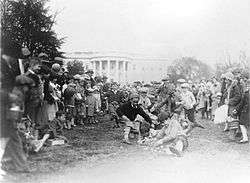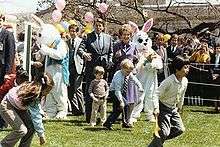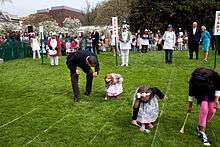Egg rolling
Egg rolling, or an Easter egg roll is a traditional game played with eggs at Easter. Different nations have different versions of the game, usually played with hard-boiled, decorated eggs.

History
Starting in 1835, Jacob Grimm and other writers proposed that the pre-Christian Saxons had a spring goddess, Eostre, whose feast was held on the Vernal equinox, around 21 March. Grimm also suggested that her symbolic animal was "probably" the spring hare, and that the egg symbolized the rebirth of the land in spring.
Some claim that Pope Gregory the Great had ordered his missionaries to use old religious sites and festivals in order to absorb them into Christian rituals wherever possible. According to Grimm and his followers, the Christian celebration of the Resurrection of Christ was ideally suited to be merged with the Pagan feast of Ēostre and many of those pagan traditions were adopted into the Christian festivities.[1] In England, Germany, and other countries, children traditionally rolled eggs down hillsides at Ēostre festivities. After mergers of celebrations, this may have become symbolic of the rolling away of the rock from Jesus Christ's tomb before his resurrection.[2] This tradition, along with others, such as what had become the Easter Bunny, were taken to the New World by European settlers.[2][3]
United Kingdom
In the United Kingdom the tradition of rolling decorated eggs down grassy hills goes back hundreds of years and is known as "pace-egging", from the Old English Pasch meaning Pesach or Passover.[4] In Lancashire there are annual egg rolling competitions at Holcombe Hill near Ramsbottom and Avenham Park in Preston. Egg rolling has been a tradition at Avenham Park for hundreds of years, but in recent years chocolate eggs have been used.[5] Other traditional egg rolling sites are the castle moat at Penrith, Bunkers Hill in Derby, Arthur's Seat in Edinburgh. and on Penshaw Hill in Tyne and Wear at Penshaw Monument.[6]
The eggs traditionally were wrapped in onion skins and boiled to give them a mottled gold appearance (although today they usually are painted) and the children competed to see who could roll their egg the farthest.[4] There is an old Lancashire legend that says the broken eggshells should be crushed carefully afterward or, they would be stolen and used as boats by witches.[7] The eggs were eaten on Easter Sunday or given out to pace-eggers – fantastically dressed characters who processed through the streets singing traditional pace-egging songs and collecting money as a tribute before performing traditional mumming plays.[8] At the Wordsworth museum in Grasmere there is a collection of highly decorated eggs made for the poet's children.[8]
In Scotland, pace-eggin is traditional from Shetland to the Borders although the day varied with location, pace-egg day variously the prior Saturday, Easter Sunday, or Easter Monday.[9] Paiss-braes, hills, were used or other grassy slopes or areas such as seaside links.[9] There is some variation in the spelling and pronunciation of the term pace, including also pash and peace.[9]
United States

In the United States, the Easter Egg Roll is an annual event, and is held on the White House South Lawn each Easter Monday for children (age 13 and younger) and their parents. It is hosted by the President of the United States and the First Lady of the United States.

The Egg Roll is a race, where children push an egg through the grass with a long-handled spoon.[10] Surrounding events include appearances by White House personalities in Easter Bunny costumes, speeches and book-reading by cabinet secretaries, and exhibits of artistically-decorated eggs.
According to tradition,[11] Dolley Madison, the wife of President James Madison, began the event in 1814 and hundreds of children brought their decorated eggs to join in games. Rolling Easter eggs was a popular annual custom in Washington DC and Alexandria, Virginia from as early as the 1850s, with children rolling eggs on Easter Monday (and sometimes Good Friday) at the Capitol, the White House and other parks and open spaces.[12] Easter eggs were rolled at the capitol as early as 1855[13] and at the White House as early as 1860.[14] By the 1870s, the Capitol had become the most popular place to roll eggs, although they were also rolled at the White House and other places.[15]
In 1876, shortly after a particularly rambunctious Easter egg roll destroyed much of the lawn at the Capitol, Congress passed a law making it illegal to use the capitol grounds as a children's playground. Heavy rain prevented much egg rolling in 1877, so the ban was not tested until 1878.[16]
.jpg)
At the request of a number of children, including his own, then President Rutherford B. Hayes and his wife Lucy Hayes brought the event to the White House lawns in 1878.[17] From that year on, the egg roll would be an annual White House event, with the exception of 1917 (moved to the Washington Monument), 1918-1920 (canceled due to food shortages and influenza concerns), 1942 (moved to the Capitol West Lawn), 1943-1945 (World War II), 1946-1947 (food conservation), 1948-1952 (restoration of the White House) and 2020 (social distancing measures to mitigate the coronavirus pandemic).[18][19]
In 1953 Mamie Eisenhower proposed that event be opened to black children, who were allowed to participate starting in 1954.[20]
The event was featured in the 2007 film National Treasure: Book of Secrets.
Other countries
In Germany, a prize is awarded to the contestant whose egg rolls fastest down a track made of sticks. In Denmark, decorated eggs are rolled down slopes in grassland or forest - the contestant whose egg rolls farthest is the winner - and the eggs are eaten after the game (if not broken). The tradition is particularly common around the town of Køge. In Lithuania one collects those eggs that are touched by the one rolled.
In Egypt, children bowl red and yellow eggs toward another row of eggs and whoever's egg cracks one egg, may claim them all.
In eastern Europe, there are other traditions such as egg tapping and egg decorating.[21]
See also
References
| Wikimedia Commons has media related to Easter Egg rolling. |
- england-in-particular: Easter Archived 2008-03-24 at the Wayback Machine Retrieved on 2008-03-14
- see http://inventors.about.com/od/estartinventions/a/easter_2.htm Retrieved on 2008-03-15
- Easter Eggs: their origins, tradition and symbolism Archived 2008-05-17 at the Wayback Machine Retrieved on 2008-03-15
- see "Curious 28". Archived from the original on 2008-03-04. Retrieved 2008-03-15. Retrieved on 2008-03-15
- Anon (2012). "Easter Egg Rolling". Preston City Council. Retrieved 7 April 2012.
- Anon (14 April 2017). "Traditional Easter fun with egg-rolling at Penshaw Monument". The Northern Echo. Newsquest (North East) Ltd. Retrieved 26 March 2018.
- "Retrieved on 2008-03-15". Timetravel-britain.com. Retrieved 2011-12-16.
- see http://www.historic-uk.com/CultureUK/PaceEgging.htm Retrieved on 2008-03-15
- "Dictionary of the Scots Language :: SND :: Pace n". Dsl.ac.uk. Retrieved 2017-04-16.
- "White House Egg Roll Transforms South Lawn". NPR. Retrieved 2011-12-16.
- "Dolley Madison Biography :: National First Ladies' Library".
- Jensen Brown, Peter (2019-04-25). "Impeachment, Congressional Subpoenas and Property Damage, How the Easter Egg Roll Became a White House Tradition". Early Sports n Pop Culture History Blog. Retrieved 1 May 2019.
- Triweekly Washington Sentinel. April 7, 1855. Missing or empty
|title=(help) - Evening Star (Washington DC). April 9, 1860. Missing or empty
|title=(help) - Jensen Brown, Peter (2019-04-25). "Impeachment, Congressional Subpoenas and Property Damage: How the Easter Egg Roll Became a White House Tradition". Early Sports n Pop Culture History Blog. Retrieved 1 May 2019.
- Arbelbide, C. L. (Spring 2000). "With Easter Monday You Get Egg Roll". Prologue Magazine. 32 (1). Retrieved 1 May 2019.
- "History of the White House Easter Egg Roll". Clinton2.nara.gov. Archived from the original on 2011-05-27. Retrieved 2011-12-16.
- "Easter Egg Roll Significant Dates". WHHA. Retrieved 2017-04-18.
- https://thehill.com/blogs/in-the-know/in-the-know/487770-white-house-cancels-easter-egg-roll
- New York Times: The egg roll (again!) becomes a stage for controversy Retrieved on 2008-03-14
- Polan, Linda; Aileen Cantwell (1983). The Whole Earth Holiday Book. Good Year Books. ISBN 978-0-673-16585-5.
